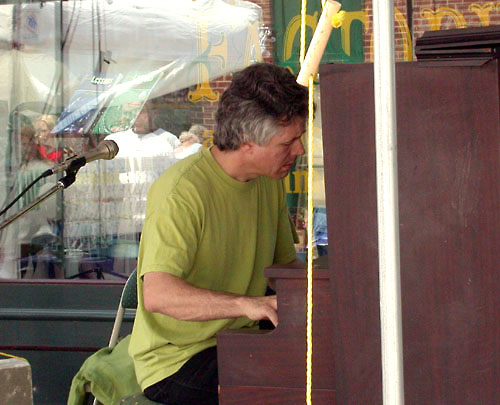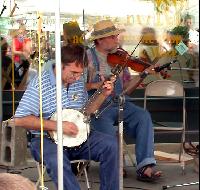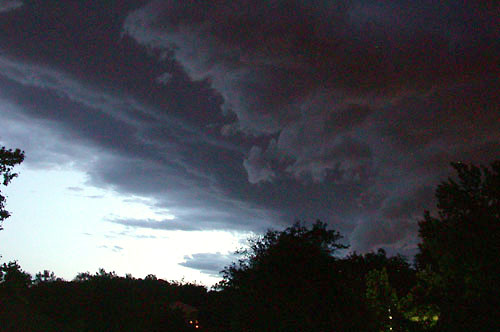The weather report last Friday said that the Mississippi River was above the high-water mark and would most likely reach flood stage by Sunday or Monday. Since I was taking a long drive on Saturday anyway, I thought I would head north to check out the Sip in a state park close to the state border.
I stopped at a Visitor Center outside Hannibal, Missouri on the way to use its restroom and also pick up state and local maps. The nice older lady providing help for visitors mentioned that Hannibal was having a street fair this weekend; if I went, make sure to pick up a fried catfish sandwich.
Well, I’d not had a fried catfish sandwich before, and the thought of being among happy fair goers had more appeal to me then walking yet another isolated trail. Besides, can’t get much closer to the Mississippi than Hannibal.
The weather was perfect for the fair Saturday: warm and humid, but with clouds and a cool breeze. The fair covered three blocks along main street, and was just busy enough to be interesting, but not so busy to be irritating. Parking wasn’t a problem, and I parked close to the riverfront, where I picked up the photo of the Martin birdhouse I showed in an earlier post.
Of course, if you’re into American literature, you probably recognize Hannibal, Missouri as the birth place for Mark Twain. The town is proud of its most famous native son, and you can’t swing a dead catfish without hitting something related to Twain or his books. One of the more popular attractions is an hour long steamboat ride along Big Muddy, and since I had not had a chance to go out on any of the Missouri rivers, I decided to take the 4:00 ride.
 The boat ride wasn’t for a few hours–just long enough away for me to visit the fair, and maybe the Twain Lighthouse. I enjoyed the various crafts, particularly hangings made of out recycled silver-plated dining utensils. However, I spent most of my time in front of the music store, listening to a jazz pianist who was playing modern ragtime. The player was a man wearing a green t-shirt and black jeans, sitting at an old upright piano, and his music was amplified by a mike used for singers in the group following, but the music was as pure and as sweet as the syrup used to make the sugared popcorn being sold by one of the many church groups that had stands.
The boat ride wasn’t for a few hours–just long enough away for me to visit the fair, and maybe the Twain Lighthouse. I enjoyed the various crafts, particularly hangings made of out recycled silver-plated dining utensils. However, I spent most of my time in front of the music store, listening to a jazz pianist who was playing modern ragtime. The player was a man wearing a green t-shirt and black jeans, sitting at an old upright piano, and his music was amplified by a mike used for singers in the group following, but the music was as pure and as sweet as the syrup used to make the sugared popcorn being sold by one of the many church groups that had stands.
The player’s songs were note perfect except for the last one he played. Halfway through, he hit wrongs notes and you could hear a faint ’shit’ come over the mike. He started again, and hit the same wrong notes, fingers tripping over each other until he came to a confused halt. Turning to the audience, he said he’d only learned the music for the piece he was playing in the last week. As he turned back to the piano for another go, some people left, made uncomfortable by his mistakes, probably wondering why he didn’t play something he knew flawlessly, rather than a piece that left him so vulnerable.
I had no intentions of leaving now, not after all his effort, and putting himself on the line as he did; but I have to admit I was anxious as he approached the problem notes. There was a hesitation, and a little faltering, but then I knew he’d found his groove, and the mistarts were worth the effort. No wonder that piece was so tough to play–it was some of the most intricate and hauntingly beautiful modern rag I’d heard.
Afterwards, we applauded like mad, happy that he decided to include a song that he hadn’t polished and practiced for months on end; I don’t think the music he played will ever be as fresh, and special, as it was during Saturday’s playing. And I imagine no other applause will sound as good to the pianist.

After that emotionally stressful, but rewarding, moment, I felt the need for sustenance and made my way to the food court: a couple of stalls set up in a side street, far enough away to keep the smoke of the grills from blowing into the rest of the fair. I was given a choice between pork steak sandwich, sausage and hotdogs on rolls, chicken kabobs, of all things, and the fried catfish sandwich.
I circled a couple of times, just to make sure I wasn’t missing anything, and when I ordered the guy joked that wouldn’t it be nice to stand at the front and ask for a sample platter with a bit of everything? When he returned with the sandwich, I replied that I had to choose the catfish, the lady at the visitor center personally recommended them.
“Short lady? Older? Yeah, that’d be Susan. She’s about as friendly as they come”
I agreed and then went around to the side to get the sauce for the sandwhich. As I was putting it on, a lady from the sausage place asked the guys with the catfish if they wanted to trade sandwiches. Sure they called out. I imagine one gets tired of only fish, or only sausage. Me I bit into that sandwich and it was about the best thing I had ever had in my life. Fine, crunchy cornmeal crust with a hint of pepper and salt surrounded delicate, moist white fish, all set off by a tangy sauce.
I continued to walk to the hill containing the Twain Lighthouse, looking at the stalls and listening to a barrage of music including native American and Andean pipes, both of which sat a little odd among the blue jean overall clad farmers and towns people. But hey, whatever rings your chimes.
 I don’t know what the Hill is called that holds Twain’s Lighthouse, but the damn thing is steep. Halfway up I was gulping for air, and standing next to the hillside to catch breezes off the River. Helpful people on the way down warned me I was only half way, probably thinking the lady with the red face is going to expire right then and there.
I don’t know what the Hill is called that holds Twain’s Lighthouse, but the damn thing is steep. Halfway up I was gulping for air, and standing next to the hillside to catch breezes off the River. Helpful people on the way down warned me I was only half way, probably thinking the lady with the red face is going to expire right then and there.
The Lighthouse isn’t really a lighthouse. It’s just a little structure created to honor Mark Twain. When I got to the top, and saw that it wasn’t really a lighthouse–feeling a bit like the kid attending a carnival side circus and finding out at the mermaid is just a half naked lady in a swim suit–I thought about just quitting then and there instead of taking the last flight of very steep steps. Then I thought about writing about this experience, and how folks reading would want to hear about how I made it all the way to the top, so I continued. All the while, though, I was muttering about this ‘damn monkey on my back’ that wouldn’t let me quit when I was tired and didn’t want to continue.
Finally I made it to the top and hastened over to the sidewall, grasping it to keep on my wobbly legs, pretending to look at the River, but really trying to catch my breath and cool my face. A family was there, with an older man chatting with them. I thought they were together but when the family used the occasion of my appearance to flee, the man came over to me and started talking to me. Since I didn’t catch his name for the sake of this tale, I’ll call him the Guide for the rest of this writing.
The Guide told me he’d been retired since the age of 49, and spends his days now checking the weather and climbing the hill and talking to people. He talked about the buildings around town, and the flood of ‘93, and how Hannibal got its floodwall just in time. He pointed out the Wabash Bridge, the oldest structure spanning the River, and the spot where the bridge that used to connect Illinois and Missouri was before they had to tear it down because it was getting old.
 He was born in 1939, and wore a faded red and gray hardware store cap, thin, worn white t-shirt, and baggy blue jeans – the kind farmers wear, not kids in LA neighborhoods. His eyes were a watery blue, and his teeth were yellowed and the gums red, which most likely meant he smoked or chewed tobacco or both. He had a gut and a look about his face, which seemed to say he wouldn’t be amiss to a beer or two. I realized he was probably about 69 and he didn’t look bad for his age. He didn’t look good, but he didn’t look bad.
He was born in 1939, and wore a faded red and gray hardware store cap, thin, worn white t-shirt, and baggy blue jeans – the kind farmers wear, not kids in LA neighborhoods. His eyes were a watery blue, and his teeth were yellowed and the gums red, which most likely meant he smoked or chewed tobacco or both. He had a gut and a look about his face, which seemed to say he wouldn’t be amiss to a beer or two. I realized he was probably about 69 and he didn’t look bad for his age. He didn’t look good, but he didn’t look bad.
 He told a great story, mixing historical facts with what he’d said at the time, or what his brother said, like the time there was an accident on that old bridge and the traffic crawled along for two hours. We don’t really know what traffic congestion is, he said, until we get stuck on a two lane road crossing a bridge over a big river and there weren’t no other ways to get across. But did they cover this on the news? Warn people not to take the road? No siree, all the news would cover is St. Louis. Journalists, he said with affectionate disgust – don’t have a bit of common sense among them.
He told a great story, mixing historical facts with what he’d said at the time, or what his brother said, like the time there was an accident on that old bridge and the traffic crawled along for two hours. We don’t really know what traffic congestion is, he said, until we get stuck on a two lane road crossing a bridge over a big river and there weren’t no other ways to get across. But did they cover this on the news? Warn people not to take the road? No siree, all the news would cover is St. Louis. Journalists, he said with affectionate disgust – don’t have a bit of common sense among them.
The Guide reminded me what Dave Rogers’ said about story-telling, in that it …imposes a structure on a narrative, given that stories have a beginning, a middle, and an end. The Guide said he knew the flood of ‘93 was going to happen, even if the weather people predicted a drought, because he watched what the animals did and you could see what would happen to weather more from them than any instrument. He was there when the levy broke, and he watched, from his hill, the waters flow and stretch until they filled the valley to the distant mountain ranges. He talked about journalists coming from all over in the weeks following, but seemed especially intrigued about meeting the journalists from Germany and Japan–as if there being here represented a crossing bigger than just an ocean and a bit of land. However, over time, the flood waters receded and this was the end to both the flood and the story. I think the Guide was secretly a little disappointed, because the only people left to tell his story to at this point were townspeople who had lived it, or heard it, too many times in the past.
And people like me, of course, who made it to the top of the hill, and who didn’t mind sitting for a time and hearing stories.
I stayed chatting until thinking that it might be close to the time for the boat to leave–I wasn’t wearing a watch–and then headed back down the hill and through town. I checked with someone along the way, and found that I had a few minutes to spare, and stopped to listen to the group of people who had replaced the piano player. They were the most motley assortment of musicians, but the music they played was good, and it seemed like they were having a fine time. The crowd liked it.
Every body was in a real good mood.
At the boat, when I boarded I found an area with five seats and sat way in the front of the pilot’s cabin. A family of three, Mom, Dad, and grown daughter, were looking for seats and I pointed out those around me were free. They sat there for a time, speaking Russian, until they spotted some people on the main deck. They trooped down with exclamations of delight at meeting up with this other family, with mutual hugging all around. I could hear the daughter saying something about how they thought they might run into each other in town, but not on the same boat taking the same tour. More back clapping and shouts of amazement, leaving all those around wondering at the circumstances of this chance meeting. Reminds me of picking up a book in an airport book store, reading enough to get intrigued, and then having to put it down because they call your plane out. By the time you get home, you can’t remember the name of the book, so you never know what the beginning and end are to the story.
Anyway, back to the boat. When it was about five minutes after the time to leave, the pilot came on to the loud speaker and said they were leaving directly, but also warning those of us sitting in the front to be prepared to cover our ears when the horns blew. I was glad for the warning, because those horns were loud enough to wake the dead.
The trip wasn’t from anywhere, to anywhere. It was a jaunt on the Mississippi, with the pilot telling stories most of them punnish, and therefore bad and appropriate. I finally had a chance to go out on the river and I was content, and even a bit surprised because there was distinctive ocean smell to the water. As I was watching the waters go past, listening to the drone of the captain tell some story about a young indian woman jumping from the local lover’s leap, I felt a bit guilty for my earlier grumpy thoughts about readers being a monkey on a writer’s back; after all, if I hadn’t pushed myself to go the last few steps to the lighthouse, I wouldn’t have met my own tour guide, and he was worth the trip himself, because you don’t get a better view of life on the Mississippi except for people who have lived there, year in and out.
Besides: readers don’t ask to be readers, anymore than those folks listening to that pianist play ask to be an audience.
We could see that the waters were very high, almost over the railway tracks in places. All the floodgates had been shut at the Hannibal floodwall except for the one leading to the boat. I wondered if the people in the area didn’t get tired of the potential risk of flood, but these people have learned to live with the River, even when the water was in a surly mood. Those who couldn’t handle it, left. Those who remained demonstrated a graceful acceptance of events outside their control, with a philosophical humor that would shame the most sophisticated New Yorker.

When the boat docked, it was late and I headed home. The road was relatively clear of traffic and though storm clouds threatened, I didn’t get any rain.
On the way back I thought that the Guide’s sureness about the coming flood in ‘93, and was, again, reminded of Dave Rogers’ narrative writings, which have been on my mind of late. I used to think that ‘writing our own narrative’ had to do with self-deception, and I wondered if the Guide’s sureness about the coming flood was at least due as much to hindsight, as it was keen weather acumen, and animal observation.
But it was something new that Dave wrote that gave me a better understanding of what I think he means by creating a narrative:
What I’m trying to do is to discern how much of what we do (narrative) is thoughtless “behavior” that addresses immediate issues of “feeling” and which is often counter-productive (i.e. leads only to more bad feelings which require more narrative to assuage, and thus repeating the cycle).
…
I think the only power we have is the power to choose. I think when we focus on the difference between the way things are, and the way we’d like them to be (our narratives) – in essence, when we focus on our suffering – in making our choices, we make the kinds of choices that will only lead to further suffering. In effect, we are steering by the wake. All narrative constructions are products of our past, even though they purport to be visions of our future. Adhering to narrative becomes a focus on the past at the expense of a present which simply is the way it is, and of a future which will be what it will be and almost certainly will not be what we wish it to be in our narratives.
I found the following sentence from the quote to be especially compelling: I think when we focus on the difference between the way things are, and the way we’d like them to be (our narratives) – in essence, when we focus on our suffering – in making our choices, we make the kinds of choices that will only lead to further suffering I have been tired of late, and it shows both in writing and photography. Neither seems to give me as much joy as they once did, and I’m not sure why. Perhaps I am burned by the constant need to produce compelling material; that ‘monkey on my back’ feeling I discussed earlier.
By compelling material, I’m not talking about my writing about bookbinding, or Emily Dickinson. I’m talking about when I write critically about MT or WordPress or Atom (or RSS) efforts, or politics, or even weblogging and therefore draw the acrimony of those who might previously have welcomed me as one of their own. The more I write, the more isolated I feel. Am I then reacting to these feelings of isolation, creating a new role for myself as Defender of Truth, and Protector of Users?
Yes I admit my own faults, but I don’t stop with self-flagellation–I also insist others also practice this same level of self-honesty, and if they don’t, I will drag them, kicking and screaming into the light and point a trembling finger of rightousness at them.
Maybe that’s why I’m so tired lately; so frustrated, and yes, even disappointed: I’m trying to create a world that can’t possibly happen–because only we can judge our own honesty– rather than just accept what is. Or as Dave wrote in another of his narrative posts, questioning David Weinberger’s phrase, writing ourselves into existence:
I think all the attention we pay to revising and editing, and paying attention to the past and trying to navigate to a “happy ending” is what separates us from our existence. The happy ending is now. It just never ends. Well, maybe it will end tomorrow. But tomorrow takes care of itself, if you let it. If you don’t try to make tomorrow conform to whatever your conception is of what tomorrow should be. I think.
Anyway. That’s probably enough about that. People can do whatever they damn well please, and if they want to spend their lives “writing themselves into existence,” well, who the hell am I to tell them they shouldn’t? Nobody at all.
Yeah. Who the hell am I to tell people what they should or shouldn’t do?
I thought all this while driving back, after a lovely day, filled with a delightful fried catfish sandwich and a fruit slushy on the boat, ragtime tunes dancing through my head. The next day when I wrote a critical weblog essay about WordPress, I ended up pulling it, and not just because of interactions via email or support forum but because I found myself in that same position of being dissatisfied in my writing, and this time I was determined not to continue falling into that same old routine.
When I read Sam Ruby’s plea for detente (sorry about improper character usage – It doesn’t publish cleanly), my first reaction was to write, Well, I’ll believe that when I see…, urp, there I go again. Or something along the lines of, Oh no! Here we go with another round of boys playing well, before boys play badly–but I didn’t. I stopped myself, and posted best wishes for the effort and a nice photo for Sam.
But then, as I was writing and pulling and writing some more, a new storm approached from the West and seeing it, I grabbed my camera to go down stairs and get more cloud pictures. Pretty, neat looking cloud pictures. As expected, the tornado alarm rang out, but what wasn’t expected was the wind that hit, and how fast it hit: from a gentle breeze to winds the force of a wall, knocking me back into the house, tearing the chimes off their hook and throwing them around in addition to the branches from the trees.

For some reason I can’t fathom, I stayed on the deck trying to grab photos of the debris flying through the air, but couldn’t because the wind was so strong, and it was so hard to control the camera. But I could hear the transformers blowing, and saw the smoke of the one nearest, and heard what sounded like roofs lifting, and then the power went off and my roommate came out on to the porch to suggest we shut the door.
Ten minutes later, it was all over, except for the fire and police sirens.
 We walked about later that day and looked at the damage. We met a lot of our neighbors (one young lady going, “It’s amazing how a downed tree and no power brings a neighborhood together”), stopping along the way to watch the smoking, sparking transformer. One of the baby bunnies was out, looking as cute as can be and I wished I still had battery life to take a photo of it. I knew I wouldn’t be able to find it later, and thought it would be a nice addition to the photos of impressive looking clouds.
We walked about later that day and looked at the damage. We met a lot of our neighbors (one young lady going, “It’s amazing how a downed tree and no power brings a neighborhood together”), stopping along the way to watch the smoking, sparking transformer. One of the baby bunnies was out, looking as cute as can be and I wished I still had battery life to take a photo of it. I knew I wouldn’t be able to find it later, and thought it would be a nice addition to the photos of impressive looking clouds.
But as we walked back home, under the tree by our townhome, we found a branch with a nest attached to it on the ground. Scattered throughout the grass were three baby birds that had been killed when the wind destroyed their home.
Yesterday morning I went out to take a photo of them, but a odd thought came into my head when I took it: Nobody posts pictures of dead baby birds. Dead people, yes; but not dead baby birds.
Today I read a post that Seb Paquet wrote about Invisible Adjunct and the fact that she’s taking down her web pages. I wrote before about how much I admire the grace with which she handled her disappointment, and the elegance with which she managed her leave taking.
Unfortunately, the community seems to feel they own a piece of Invisible Adjunct because not long after she shut down her weblog, an Invisible Adjunct Topic Exchange was created. Now, Invisible Adjunct is taking down her pages and the community is debating on who exactly “owns” her weblog, because of the comments in the pages.
People have grabbed copies of her pages and put them into other locations; others have suggested she sell them on CD; and still others suggested she could turn her IA success into job opportunities. One person wrote:
This issue really bothers me. From a legal point of view IA is entitled to do whatever she wants with the site, but I think the right thing to do is to leave a copy online. I believe the comments form the bulk of the site overall (correct me if I’m wrong), and that much of the value comes from the conversations that took place under IA’s supervision. In some sense she’s not the “author” of the site, but rather the caretaker of an online community. She played the fundamental role of organizing the site and leading the discussion, and is clearly in charge of the web site. However, it would be terrible to see all these conversations and discussions erased forever, without even any explanation of why.
This issue really bothers me: that some of IA’s readers feel that she has a moral, possibly even legal obligation to maintain her pages because she really wasn’t the author–she was only the caretaker, and most of the real writing happened in the comments.
People discount IA’s participation too quickly, and too easily. Now, whether she leaves the pages or takes them down, what her readers have basically told her is that her contribution is not as important as their own. I wrote in comments at many-to-many:
One of the most graceful acts I’ve seen in weblogging is when IA quit. I loved the fact that she just left, she didn’t try to profit from her popularity online, and she left with such elegance and style. I didn’t care for the fact that a separate discussion forum was set up in her name, to carry on the same conversation. A better approach would have been to set it up under the topics involved, which seems to be graduate school, horrors or whatever.
Now, I see this clamor for keeping the pages up regardless of her option and her choice, because people think they’ve written such beauty in her comments that it must be preserved.
The beauty of IA’s act was as much in the ephemeral nature of the existence of her pages as anything else. People mirroring the pages, downloading the archives, setting up forums — not letting her go! Those crying for their lost comments have taken a graceful act and made it into a circus.
I thought it was the critical nature of my writing that formed my unhappy narrative, but I can see now I was wrong; I see the roots of my own discontent whirling about in the storm currently raging about Invisible Adjunct.
